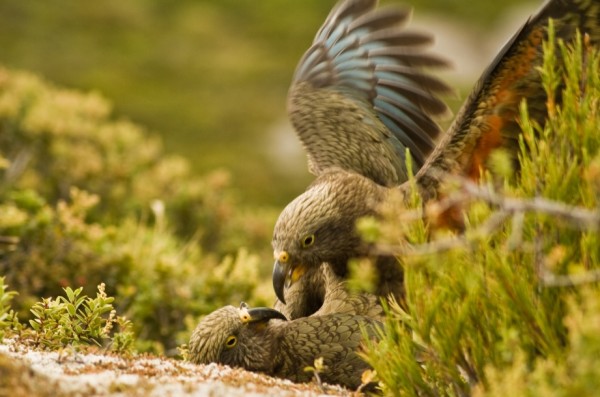By Ana Verayo, | March 21, 2017

Specific calls of playing keas trigger playful emotions in other, non-playing birds, just as laughter does for us. (Raoul Schwing/Vetmeduni Vienna)
Scientists have revealed that a certain New Zealand parrot species can laugh with each other. This unique bird can apparently produce a "play call" that signals others to play and puts each other in a joyful mood.
This event is called positive emotional contagion which means that these outward emotive actions can spread from one bird to another, such as laughter. For humans, it's more obvious, however, among animals, this phenomenon is more discreet. Scientists call this play vocalization among some animal species, and this can act as a type of emotional contagion.
Like Us on Facebook
In this new study, scientists from Messerli Research Institute in Austria and Auckland University were able to provide evidence of this "emotionally contagious" vocalizations for the first time among birds, especially in kea parrots. Before this, only mammals were observed to exhibit such behavior.
During observations, the team monitored kea parrots and listened to how they interact with each other. Researchers observed all of their vocalizations and successfully identified a specific play call which provided them important clues about the play behavior patterns of these parrots.
The team suggests that these play calls can serve as laughter in humans, which can spread among other parrots to suggest play time. For an experiment, researchers played back play vocalizations to the kea parrots for five minutes. They also played other stimuli such as other kea parrot calls that are not play vocalizations, a South Island robin call, and a standardized tone. This experiment helped the team to observe and differentiate the birds' reactions to different calls and sounds.
Their findings revealed that when kea parrots heard these play calls, they began to play with each other and for a longer period, as opposed to hearing other sounds. This play vocalization can apparently spread playful behaviors among juvenile and adult birds, similar to how humans laugh with each other.
Researchers also revealed that when the parrots heard the play call, some of them started playing with non-playing birds or began solitary play by performing aerial acrobatics. This call does not mean an invitation to play but rather, to induce playfulness among the kea. This hypothesis suggests that play vocalizations can also act as positive emotional contagion among birds.
This new study was published in the journal Current Biology.
-
Use of Coronavirus Pandemic Drones Raises Privacy Concerns: Drones Spread Fear, Local Officials Say

-
Coronavirus Hampers The Delivery Of Lockheed Martin F-35 Stealth Fighters For 2020

-
Instagram Speeds Up Plans to Add Account Memorialization Feature Due to COVID-19 Deaths

-
NASA: Perseverance Plans to Bring 'Mars Rock' to Earth in 2031

-
600 Dead And 3,000 In The Hospital as Iranians Believed Drinking High-Concentrations of Alcohol Can Cure The Coronavirus

-
600 Dead And 3,000 In The Hospital as Iranians Believed Drinking High-Concentrations of Alcohol Can Cure The Coronavirus

-
COVID-19: Doctors, Nurses Use Virtual Reality to Learn New Skills in Treating Coronavirus Patients







